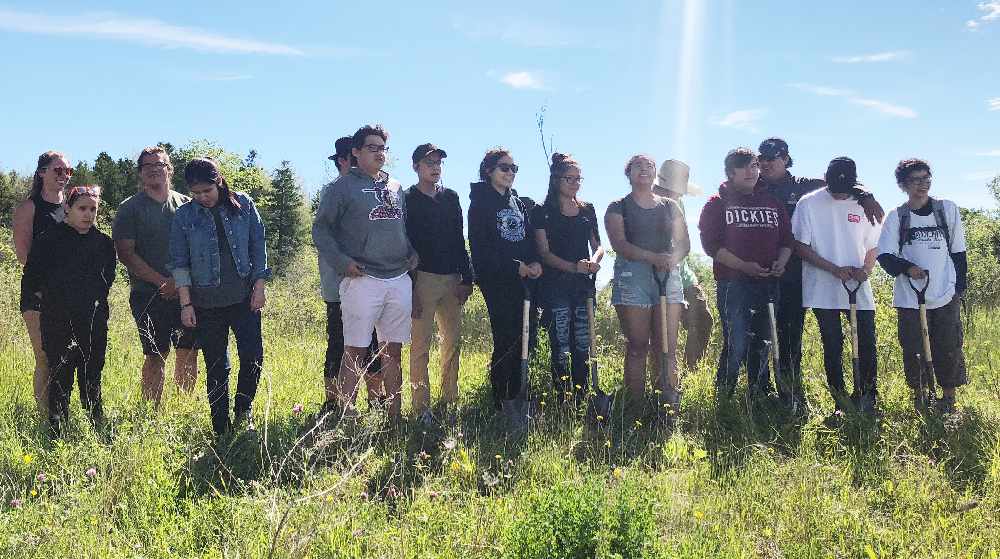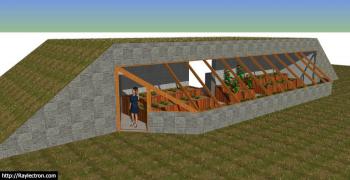Image Caption
Summary

Students at Wasse-Abin Wikwemikong High School who participated in the ground breaking ceremony on June 19. (Photo: provided by Focus Forward)
By Shari Narine
Windspeaker.com Contributor
WIKWEMIKONG UNCEDED TERRITORY, Ont.
Shovels went into the ground Tuesday morning for a greenhouse that will be built into the south-facing slope adjacent to the Wasse-Abin Wikwemikong High School.
It’s a unique concept that Christianna Jones, apprenticeship coordinator with the Wikwemikong Development Commission, is proud of.
“We did quite a bit of research and we looked at how we could do it, the most cost effective way to heat the greenhouse,” she said. Part of the commission’s focus is agriculture.
Excavating into the earthen slope will allow the greenhouse to be heated by the biothermal energy from the ground, as well as provide insulation. The pillars holding up the roof will be painted black to absorb the daytime heat, which will then radiate throughout the night. The facility will be solar-powered. The greenhouse building will span 56 feet long and 24 feet wide.
Excavation will begin next week with construction expected to be completed by the end of August. About a dozen students from the high school will participate in the two-month build, employed and paid by the commission, working alongside contractors.
Capital costs of the greenhouse is about $150,000.
Evan Veryard, founder of Focus Forward, said part of his organization’s commitment to the greenhouse project is to help secure funding. Recently, $50,000 was obtained through the Ontario Skills Catalyst Fund. Focus Forward, a not-for-profit organization, partners with Indigenous communities to facilitate trades-based educational projects that are locally developed and allow students to give back to the community.
“The goal of the project is to provide an opportunity for the students to experience the trades first hand, dive into a project and re-engage in their education in a way, and get a cool learning opportunity that maybe you can’t get in a traditional classroom setting,” he said.
Once the greenhouse is operational, three green industry courses will be offered at the high school, benefiting the students with credits earned from hands-on learning, exposure to healthy food and increased awareness of local agriculture. The controlled environment of a greenhouse will allow the students to learn new technologies in the agriculture field and will allow year-round activities and learning.
While decisions have yet to be made regarding the produce grown and who will consume it, Jones anticipates that vegetables such as tomatoes, kale, lettuces, and cucumbers, which will be grown during the winter, will be served in the school’s cafeteria. Seeds will also be started in the greenhouse and will be available for community initiatives, such as the soon-to-number 400 raised garden beds, which are part of Wikwemikong’s Foodshare program.
Students will also be taught to seed save. It will all combine to encourage and assist community members to start growing their own food locally, allowing them to relearn skills and gain back the knowledge necessary for sustainable living on the land.
The Wikwemikong Greenhouse for Change is a community project, says Jocelyn Bebamikawe, employment and training officer for the commission.
“We’re trying to make this a community effort so everybody understands the importance of the greenhouse,” she said.
The project is a collaboration between the commission, the Wikwemikong Housing Department, Technical Services, Department of Lands and Natural Resources, Public Works, Wikwemikong Board of Education, Wikwemikong Heritage Organization and Focus Forward for Indigenous Youth.
“We always try to work with the school and post-secondary unit to work to help our students and to help our community members,” said Bebamikawe, noting that the commission will also offer students financial literacy training.
Wikwemikong Unceded Territory has a population of about 3,500. About 3,200 live on-reserve where all four schools, including Wasse-Abin Wikwemikong High School, are located.

